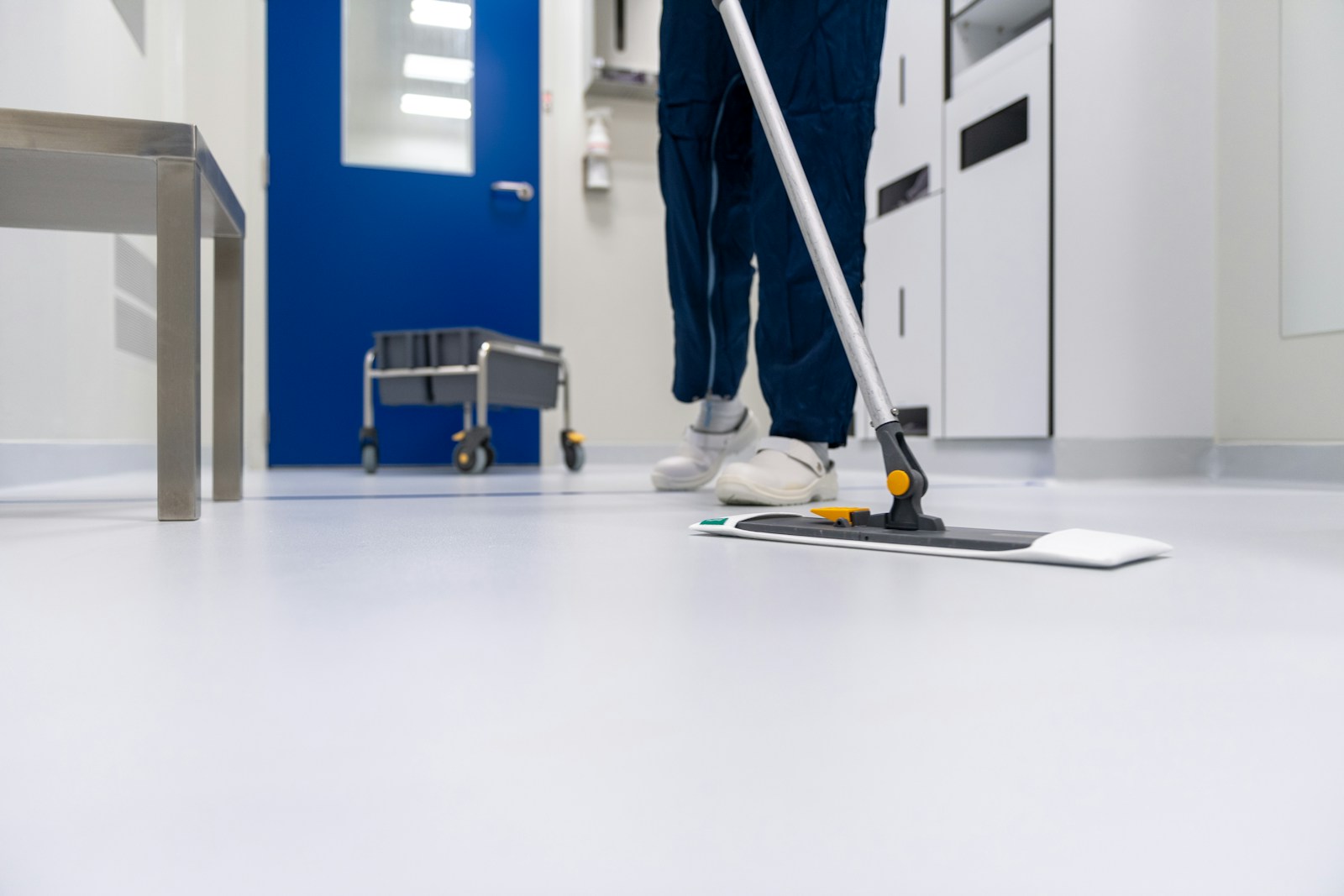
Cleaner Job Description and Types of Cleaning Jobs
- Domestic Cleaners: Work in private residences, performing tasks such as cleaning rooms, doing laundry, ironing, and sometimes cooking or childcare. They need to be trustworthy and have strong interpersonal skills due to direct interaction with homeowners.
- Office Cleaners: Maintain cleanliness in office spaces, including desks, floors, restrooms, and kitchens, typically working outside regular office hours to avoid disruption.
- Industrial Cleaners: Operate in manufacturing plants, warehouses, or construction sites, cleaning machinery, handling waste, and ensuring safety standards. This role often involves specific training due to potential hazards.
- Healthcare Cleaners: Work in hospitals and clinics, following strict hygiene protocols to prevent infections, and may handle biohazardous materials.
- School Cleaners: Ensure cleanliness in educational institutions, cleaning classrooms, hallways, restrooms, and cafeterias to provide a healthy learning environment.
- Retail Cleaners: Keep retail stores and shopping malls clean and presentable, which is vital for customer satisfaction and safety.
This diversity highlights the adaptability required in the role, with each type contributing to public health and safety in unique ways.
Cleaner Job Duties and Responsibilities
- Sweeping, mopping, and vacuuming floors to ensure they are free of dirt and debris.
- Dusting furniture, shelves, and other surfaces to maintain a tidy appearance.
- Cleaning windows, mirrors, and glass partitions for clarity and hygiene.
- Emptying trash bins and disposing of waste appropriately, often following recycling guidelines.
- Cleaning and sanitizing restrooms, including toilets, sinks, and floors, and replenishing supplies like toilet paper and soap.
- Reporting maintenance issues or damages to supervisors for timely resolution.
For domestic cleaners, additional tasks may include:
- Washing and ironing clothes, making beds, and changing linens.
- Cleaning kitchens, including washing dishes and appliances, and sometimes preparing light meals.
- Performing light gardening or outdoor cleaning tasks as needed.
In industrial or specialized roles, duties might involve:
- Using heavy-duty cleaning equipment, such as floor scrubbers or pressure washers.
- Handling hazardous materials safely, following safety protocols to protect themselves and others.
- Adhering to strict sanitation standards, especially in healthcare settings, to prevent infection spread.
These duties ensure that all environments remain clean, safe, and functional, with specific tasks tailored to the setting’s needs.
Cleaner Salary and Compensation
- Average Salaries: Various sources indicate that cleaners earn between R5,000 and R10,000 monthly on average.
- Minimum Wage: As of July 2025, the minimum wage for contract cleaners is ZAR28.79 per hour in rural and other regions (Area C) and ZAR31.69 per hour in urban centers (Area A), such as Cape Town, Johannesburg, and Tshwane. Assuming a standard 40-hour work week, this translates to approximately R4,606 to R5,070 per month.
- Variations: Salaries can be higher for cleaners with experience or in specialized roles, such as industrial or healthcare settings. Urban areas generally offer higher wages due to cost of living and demand, while rural areas may have lower pay. Some cleaners are employed on a contract basis, which might affect job security and benefits, while permanent positions may offer additional perks like medical aid or pension contributions.
The cleaning sector’s informal nature can lead to wage disparities, with labor unions and government legislation advocating for better pay, though enforcement remains a challenge, especially in informal settings.
Cleaner Job Requirements and Qualifications
- Education: While no formal education is typically required, some employers, especially for commercial or industrial roles, may prefer candidates with a Matric certificate or equivalent. For instance, job listings often mention Grade 10 as a minimum for certain positions.
- Experience: Previous cleaning experience is often preferred, particularly for roles in corporate or commercial environments. This experience can demonstrate reliability and familiarity with cleaning techniques.
- Skills: Knowledge of cleaning products and techniques, ability to use a variety of cleaning equipment (e.g., vacuum cleaners, floor polishers), and basic understanding of general hygiene practices are essential. Good knowledge of facility layout and cleaning product applications is also valued.
- Personal Attributes: Reliability, attention to detail, physical fitness, ability to work independently, and good time management are crucial. Cleaners need to be well-motivated, task-focused, and proactive, with strong people skills for interacting with clients or supervisors.
- Legal: For some positions, especially in government or sensitive areas, a clear criminal record and being a South African citizen may be required. Contactable references are often necessary to verify past employment.
Additionally, completing training courses can enhance skills and employability. The Services SETA offers training and courses for various cleaning services, which can prepare cleaners for professional roles and potential career advancement. Efforts to professionalize the industry include programs for hygiene controllers and technicians, with durations like 15 months for basic training, offering pathways for skill development.
Working Conditions and Career Progression
Industry Trends and Context
- Eco-friendly Cleaning Products: There is a growing demand for environmentally friendly and sustainable cleaning products, such as biodegradable detergents and natural disinfectants, driven by consumer awareness and environmental concerns.
- Automated Cleaning Equipment: The use of robotic vacuum cleaners, floor scrubbers, and other automated devices is increasing, especially in large commercial spaces, to improve efficiency and reduce labor costs.
- Specialized Cleaning Services: Post-COVID-19, there is heightened awareness of hygiene, leading to increased demand for deep cleaning, sanitization, and disinfection, particularly in healthcare and hospitality sectors.
- Professionalization: Efforts to professionalize the industry include training programs and certifications, aiming to enhance skills and service quality, with models like hygiene controllers and technicians being developed.
The industry is a sub-sector of the finance, real estate, and business services economic sector, contributing about 0.8% to GDP in Q3 2019, and is seen as a critical employer, especially for youth and women, with potential for job creation due to low barriers to entry and competition.
Leave a Reply